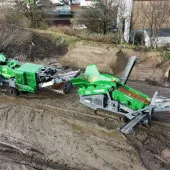Efficient coal processing with McCloskey

UK Coal operate a number of deep and opencast mines across the country, and as with any modern business the need for efficiency is essential for both commercial and environmental reasons. At the company’s Kellingley Colliery, in North Yorkshire, extracted coal product is sorted into three different sizes – doubles, trebles and cobbles – in a process that uses mobile screening machines fed by other heavy equipment including conveyors and excavators.
As well as utilizing a McCloskey S130 screener to size material, another is fitted with a shredder to blend additional material into the coal if requested by customers, eg to ensure it burns at the temperature required by their furnace. According to Ian Ferguson, surface superintendant at Kellingley, the McCloskey screens are good machines and very robust.
Having been through a thorough screening process, the end products are typically distributed nationally by coal merchants and are ultimately consumed in a variety of ways, from powering stoves in the home to generating electricity at power stations. This means that effective and reliable processing is not just profitable, it is critical. For example, Drax power station in North Yorkshire – the highest-capacity power station in Western Europe – relies on Kellingley for some 2 million tonnes of coal per year (around 20% of the power station’s annual fuel requirement).
Meanwhile, by-products of the coal mining operation that would have previously been considered waste are increasingly being used in innovative ways, thanks to modern, cost-effective processing equipment and techniques. This means that mine operators can reduce waste costs and sell new material with little extra effort, all while addressing environmental concerns.
For example, the solids from slurry generated by washing are being used in road construction in projects such as the Selby Bypass, and have also been used to develop and maintain some of the country’s flood defences, protecting homes as well as farms and wildlife from the dangers of rivers bursting their banks.
A vast amount of potential energy exists in domestic coal reserves, and some sources say the UK has enough coal to be self-sufficient for decades to come, but demand is dropping as governments look to new sources for cleaner energy. However, with uncertainties in other sectors, increasingly resource-efficient operations, and new processes such as CDCL (Coal-Direct Chemical Looping) and other ‘zero-emission coal’ technologies on the horizon, the future could be bright for Britain’s coal industry.
Noel McCloskey of McCloskey Equipment Ltd commented: ‘I am pleased to see our machines doing good work for the British coal industry and I’m sure that we have something to contribute to similar operations.’







